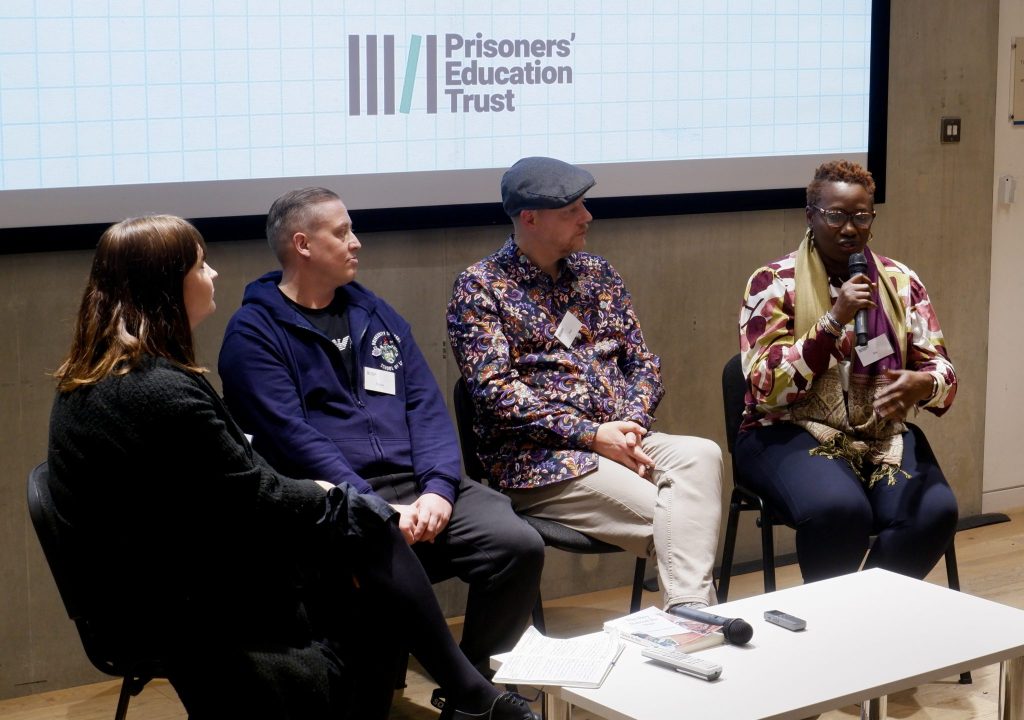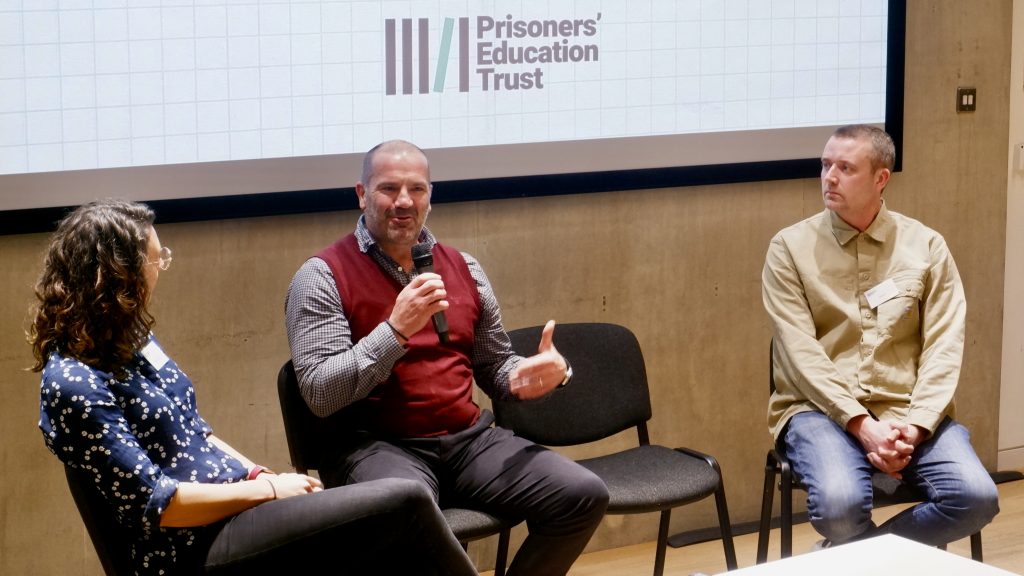
PET trustee Vicki (left) and alumni Dalton, Paul and Ola (who is also a trustee at PET)
Five of PET’s former learners recently spoke about the impact of studying in prison at our Brighter Futures supporters event in London. Here, we find out their stories.
Paul is now an artist who also works as a housing management assistant at a charity for people who are at risk of homelessness.
I left school with no education, no qualifications at all. I left two weeks short of my sixteenth birthday to get a job, to make money for the family.
In prison, I started to take a really deep interest in art, and wanted to take it beyond the levels that they were offering in education. So I applied to PET to do one of their art courses.
In open prison, I applied to go to university. I was only the second person to go from that prison. They sent two of us that year: one was doing shipbuilding; I was doing art – you couldn’t get more different.
But the whole point is, it’s about learning. It’s about improving yourself. It’s about finding out what you care about. Studying has proved that I’m not just a reactive person. I can think, I can process. I can take in information and then I can get that information out there in a whole new way. Education gives you the power and the ability to get your point across in a much improved way.
That’s what education has done for me: it’s made me rethink my whole outlook on life.
I’ve been out of prison now for six years. I got a BA, I got a First, and went on to do my Masters as well. I was the first person in my family to go to university. I’ve become a bit of role model for my nieces and nephews. They can see that, growing up on a “sink estate”, there’s better things that you can get from that. Your future is not written because of where you come from. It’s a hard struggle, I’m not going to deny that, but you can better yourself.
It’s all from those little steps in a prison education department. Because I gave up at school: it really was horrendous. But I’ve turned that around. I like the person I am now a lot more than the person I was.
Through working with PET, Koestler Arts and The Longford Trust, I found that I wanted to add a little bit more to society. I spent a lot of my life taking and now I’m giving. It’s not just about repaying; it’s about rethinking. That’s what education has done for me: it’s made me rethink my whole outlook on life. And for that I’ve got to be grateful.
Ola is now a project and business change manager and also a trustee at PET.
I had gone in to custody as a professional. So I had education up to Master’s degree. My first job was as a teaching assistant, where I helped to establish what education level every incoming prisoner had. I applied to PET for a diploma in counselling to help further my skills in helping others.
I decided to do whatever I could to ensure that educating prisoners becomes a priority
I found out in the female estate that most of the ladies had no education, or little at all. One common thread was that there was the perception that they’re not worth anything.
Nelson Mandela says that education is the greatest weapon with which to change the world. And I think that education is that key that unlocks a lot of things and makes people – like Paul has said – rethink.
I decided to do whatever I could to ensure that educating prisoners becomes a priority, because it’s not at the moment. So I came out to volunteer with PET. I wanted to give back because I was a beneficiary.
I am the first alumna of PET’s trustee development programme. And once I finished the programme, fortunately there were vacancies on the Board of Trustees. I feel very privileged to be a trustee of PET, of which I was a beneficiary.
Dalton is now studying criminology at university. He is also a speaker on trans issues in prison and author of the poetry book, The Boy Behind The Wall.
My journey started way before prison. At school I was really poorly educated. I was always told I was thick. That was the label that I carried with me. I just felt completely alienated.
So when I first saw the poster for PET I just thought, well, they wouldn’t help me. But then someone said to me, what have you got to lose? Maybe they’ll listen.
I couldn’t believe it when they said they wanted to fund me. I just thought, wow, these people really do care.
When I got the paperwork through the library, I wrote an application to PET for an Open University Access course in Arts and Languages. I said, if you give me a chance, I really will use it to my full potential.
I couldn’t believe it when they said they wanted to fund me. I just thought, wow, these people really do care. That’s when my whole narrative changed, my ability to function. I suddenly felt that there was a whole world I’d never thought of. That’s what started me on my journey in changing my label from “transgender prisoner” to that person that meant something, “a student”.

PET trustee Emily (left) and alumni – Jonny and David
David now runs a business creating courses for people in prison and has worked with PET to develop an e-commerce course.
I was lucky enough to have a university education. So when I went into prison, I was shocked by the lack of educational opportunities.
PET was the first beacon of light that I saw. Firstly, it gave people opportunity. Secondly, it gave people hope. And thirdly, it gave people freedom. Being able to learn in prison at your own pace, in your own time, in your own cell. Not being bound by somebody taking you to a classroom at a particular time, or not as the case may be, because they’re short-staffed so you don’t get unlocked and can’t go.
The freedom of being able to learn on your own is huge. If you give people opportunity, then you increase their self-worth, which is so valuable – you can’t put a price on that.
PET have helped me hugely. The first call I made after leaving prison was to the charity.
I was determined when I left prison to develop something which plugged some of the gaps that I saw. I’ve created an e-commerce course which teaches people how to set up their own business online upon release. We give people the tools to carry out the job and we offer ongoing support and consultancy.
PET have helped me hugely. The first call I made after leaving prison was to the charity. Clare Lloyd, the Head of Service Delivery, pointed me in the right direction for how to develop my course. I think it’s fair to say it wouldn’t exist if it hadn’t been for her.
The course now runs in person in multiple prisons and we have a PET distance learning offer too.
Jonny rediscovered education after working as a peer mentor, and went on to gain a master’s degree while in prison.
For me, the greatest benefit of prison education is regaining that self-respect that you squander when you offend.
Like David, I had life chances. I was brought up in a household where education was hugely respected. Initially in prison I was really pleased to help volunteer and use the skills that I had. I started working with the distance learning department at Parc prison in South Wales.
Prisoners have this affliction called FOMO – “fear of missing out”. Because I worked in education, people came knocking on my door, and asked what courses were available. I could take out the PET prospectus and they’d be quite gripped by it. One pad mate would start a course, and his pad mate would say, what you doing there? All of a sudden, you get more people doing it.
Education is all about the pride that you can have in yourself.
After a couple of years I thought that I needed to help myself as well, because there is life after prison.
I started off with a couple of GCSEs through PET – Sociology and English Literature. When I passed them, all my children sent me congratulation cards. I was a bit bashful about receiving them, having got a law degree in the early nineties, but there’s an important point there: education makes people proud.
I went on to do a master’s degree in a closed prison and when I moved to an open prison, I applied to go to Cardiff University. Now I’m out, I’m just coming to the end of four years of doing a PhD.
Education is all about the pride that you can have in yourself. When I was offending, I would travel down to visit my father. He would welcome me and say, “How successful have you been this month?” And I just had such shame, I couldn’t look at myself in his shaving mirror.
But now, many years later, I have that sense of pride back again. I can look in that mirror. He passed away in 2021 and he said that he was proud of everything I had done. That meant a lot really.
Help people in prison discover their potential. Donate to PET today.